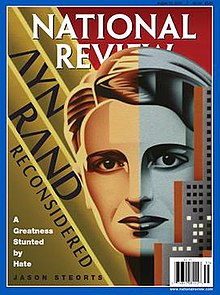National Review Online

National Review cover for August 30, 2010
|
|
| Editor-in-Chief | Rich Lowry |
|---|---|
| Categories | Editorial magazine, conservatism |
| Frequency | Biweekly |
| Publisher | Garrett Bewkes |
| Total circulation (2015) |
142,667 |
| First issue | November 19, 1955 |
| Company | National Review, Inc. |
| Language | English |
| Website | www.nationalreview.com |
| ISSN | 0028-0038 |
National Review (NR) is a semi-monthly magazine founded by author William F. Buckley Jr. in 1955. Although the print version of the magazine is available online to subscribers, the free content on the website is essentially a separate publication under different editorial direction. The online version, National Review Online, describes itself as "America's most widely read and influential magazine and web site for conservative news, commentary, and opinion."
Before National Review's founding in 1955, some conservatives believed that the American right was a largely unorganized collection of people who shared intertwining philosophies but had little opportunity for a united public voice. They also wanted to marginalize what they saw as the antiwar, noninterventionistic views of the Old Right.
In 1953 moderate Republican Dwight D. Eisenhower was president, and many major magazines such as the Saturday Evening Post, Time, and Reader's Digest were strongly conservative and anticommunist, as were many newspapers including the Chicago Tribune and St. Louis Globe-Democrat. A few small-circulation conservative magazines, such as Human Events and The Freeman, preceded National Review in developing Cold War Conservatism in the 1950s.
In 1953, Russell Kirk published The Conservative Mind, which sought to trace an intellectual bloodline from Edmund Burke to the Old Right in the early 1950s. This challenged the popular notion that no coherent conservative tradition existed in the United States.
A young William F. Buckley Jr. was greatly influenced by Kirk's concepts. Buckley, from a wealthy oil family, first tried to purchase Human Events, but was turned down. He then met Willi Schlamm, the experienced editor of The Freeman; they would spend the next two years raising the $300,000 necessary to start their own weekly magazine, originally to be called National Weekly. (A magazine holding the trademark to the name prompted the change to National Review.) The statement of intentions read:
...
Wikipedia
